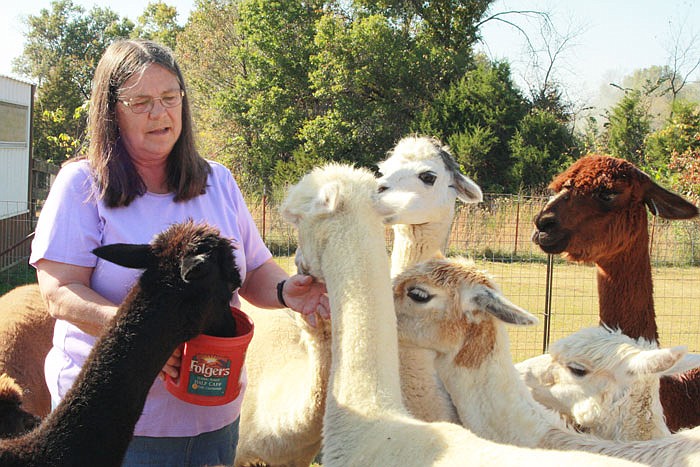Ann Mayes met her first alpaca at the Puyallup State Fair in Washington state and instantly fell in love.
"They each have their own personality," she said. "I could watch them all day."
She knew right then she had to have an alpaca. But the price was prohibitive.
Then, 13 years ago, Mayes was sitting on her porch sipping wine with a friend.
"I should sell my house and buy a farm," Mayes recalled saying.
It still sounded like a good idea in the morning. She was in her 50s. Her sons had moved out. Before long, she started with three alpacas.
Thirteen years later, Mayes has a little farm just east of Auxvasse with 28 Suri and Huacaya alpacas. Her yarn sells in St. Louis and Columbia, and she's a familiar sight at local craft fairs. The Callaway Chamber of Commerce honored her business, Alpacas D'Auxvasse, as the county's Ag Business of the Year at this year's Town and Country Dinner.
"I'm even getting a bit of a reputation as a midwife," she said.
Mayes' journey to this point wasn't the smoothest. By the time her first alpaca shearing rolled around, her herd had grown to five, and she didn't quite know what she was doing.
"I thought you just looked in the phone book under 'shearer,' like getting a haircut," she said.
Shearing turned out to be more involved than that. Shearers are typically booked months in advance. Often, small farms band together and share a shearer. Mayes was far too late. Luckily, a woman from a nearby farm offered to help.
It was chaos. Shearing five animals took five hours. (Today, with the help of a shearer and friends from neighboring farms, Mayes can get 50 alpacas sheared in as much time.) At one point, Mayes' then-70-year-old mother was sitting on an alpaca to hold it down.
"I'd never been so exhausted in my life," Mayes said.
After the shearing, she realized she didn't know what to do with the wool. A friend told her she could sell it for $5 an ounce, so Mayes took out a newspaper ad. No one called.
"You can't sell raw fiber for $5 an ounce," she said. "Not then, and not even now."
Eventually, Mayes went to Hillcreek Fiber Studio in Columbia and asked them to teach her how to spin. After that, she never looked back.
Mayes knows plenty of other alpaca farmers. There's little competition and plenty of cooperation.
"Everyone's friends, and nobody's fighting with each other," she said. "You have trouble birthing a cria (baby alpaca), and you're calling someone to say 'What do I do?'"
She said many farms develop a specialty. Hers is dyeing. In addition to her own fiber, she dyes for other farms as well.
"I feel like an old witch when I'm hanging over the pot stirring," she said.
After an alpaca is born, it's sheared every year.
Mayes pointed to her flock's newest member, a week-old white male named Murtagh after a character in the TV show "Outlander." "He'll be sheared in April with the rest."
A number of other alpaca farmers bring their animals to her farm so they can get them done en masse. About 50 alpacas and 30 people crowd around to take part in the assembly-line process. Aside from simply being rounded up and sheared, alpacas need their teeth tended, their nails trimmed - they have two toenails, not hooves - and more.
Next, the fiber is cleaned of debris, washed and sent off to to be carded. The carding process combs the fibers so they're parallel rather than tangled together. The finished product is called "roving."
"It comes back in long strips for spinning," Mayes explained.
After the carding process, Mayes spins the roving into yarn. She makes many types. Some are a mix of fibers - her most popular blend is 15 percent Merino wool and 85 percent Suri alpaca fiber. Some are thick and fluffy, while others are fine enough for lace.
"I do a lot of experimenting with them," Mayes said.
The yarn is then wound into long skeins and dyed - unless it's dark brown or black already, thanks to the alpaca it came from.
Mayes sells her fiber at every stage of the process, as well as a number of products such as rugs and stuffed animals. Even fiber that's too full of debris to card can be used to fill dog beds.
"I use every last bit of it," Mayes said.
It's how she supports her beloved flock. All of her animals get to live out their lifespans without fear of being slaughtered. Each has a name, and she adores them all.
"It's been quite a journey," Mayes said. "I wouldn't give it up for anything."
View Mayes's products at alpacasauxvasse.com, or set up an opportunity to meet the flock and see her studio by calling 573-386-3462. Visitors can stay for a weekend or a week at her other house. See vrbo.com/734972 for details.

